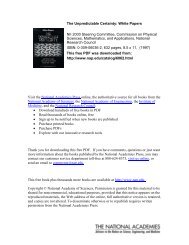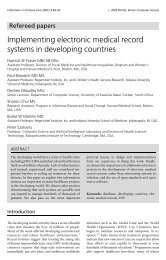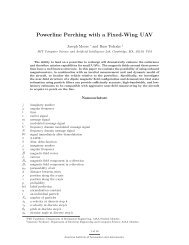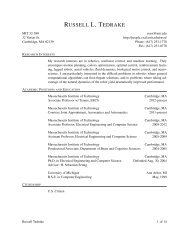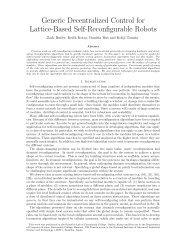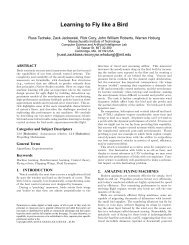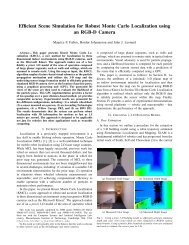Online Social Networks and E-Commerce - MIT Computer Science ...
Online Social Networks and E-Commerce - MIT Computer Science ...
Online Social Networks and E-Commerce - MIT Computer Science ...
You also want an ePaper? Increase the reach of your titles
YUMPU automatically turns print PDFs into web optimized ePapers that Google loves.
Clarence Lee <strong>and</strong> Shirley Fung<br />
Facebook, <strong>and</strong> that information is stored as internet logs. When these internet logs are used for an<br />
ongoing investigation, law enforcement officials do not have to provide notice.<br />
As consumers are spending more <strong>and</strong> more time on the Web to perform various activities, these internet<br />
logs are becoming more meaningful. As a result, investigators can take advantage of these inconsistencies<br />
<strong>and</strong> create loopholes in the system.<br />
An Example: Purchase History vs. Browse History<br />
Amazon.com keeps track of sale records of users’ purchases on the online store. Under the Title 18 of the<br />
United States Code § 2710(b), a warrant, court order with probable cause, or gr<strong>and</strong> jury subpoena, is<br />
needed for real-time interception or immediate seizure.<br />
Amazon.com also keeps track of all the user activity on the Web site. This includes page views to roll over<br />
actions on a page. Ways of tracking this type of user activity is by storing the history page requests or<br />
image requests. The collection of requests is generally considered as internet logs. According to Title 18 of<br />
the United States Code, a high probable cause st<strong>and</strong>ard is not needed to obtain internet transactional<br />
records (logs) for real-time interception or immediate seizure. Using these logs, such as a list of<br />
downloaded images (file requests to the Web server), one can easily deduce what products the user was<br />
interested in, <strong>and</strong> was probably going to purchase.<br />
Contrary to sale records, these internet logs, arguably can provide the same kind of information about the<br />
users’ purchase habits, are protected under a lower st<strong>and</strong>ard than sale records. This is problematic<br />
because law enforcement officials can now use data that is protected under a lower st<strong>and</strong>ard to construe<br />
information that they would have had to get a warrant to obtain. In other words, instead of asking for sale<br />
records to paint a picture of a user’s buying habits, investigators can simply deduce the purchase habits by<br />
asking for the internet logs using a subpoena issued at a lower st<strong>and</strong>ard.<br />
In the context of new kinds of online activities on these Web sites, the line between content <strong>and</strong> non-<br />
content communications becomes blurred. Transactional records <strong>and</strong> use of these online services can<br />
generally provide a lot salient information about an individual. Current policies do not protect the rich<br />
interactions we currently have on the Web. In addition, data mining has driven companies to create<br />
profiles using raw data collected through these Web sites. Even though internet logs are often considered<br />
as transactional data, they actually provide a lot more information about the content of the data being<br />
downloaded <strong>and</strong> accessed by users. No policy has been written to protect private information that had<br />
been derived from different kinds of data. As a result, we need to have the same st<strong>and</strong>ard to protect<br />
against abuses of loopholes within the legal system.<br />
Current Privacy Policy is Incomplete<br />
Page 23




![[ti]The “Vulgar Spirit of Blogging”: On Language, Culture ... - CSAIL](https://img.yumpu.com/18604217/1/190x245/tithe-vulgar-spirit-of-blogging-on-language-culture-csail.jpg?quality=85)




